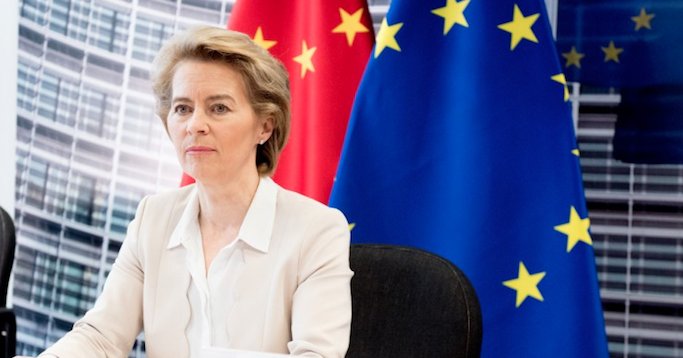After the virtual summit between EU leaders and their Chinese counterparts, both sides seemed to have very different take-aways. For their part, Li Keqiang (China’s Premier) and Xi Jinping (China’s President) seemed optimistic. Xi is quoted as saying “cooperation is far bigger than competition”. The Global Times, a mouthpiece for the ruling Communist Party, further quoted Xi as urging China and the EU to “become major forces of safeguarding global peace and stability”.
For their part, the EU leadership was more sceptical. Ursula von der Leyen warned of “very negative consequences” over the Hong-Kong National Security law – a topic that was conspicuously absent from Chinese state media reports. For his part, Charles Michel, the President of the European Council, emphatically stated : “We do not share the same values, political systems, or approach to multi-lateralism.”
During the 22nd bilateral summit between the EU and China on June 22nd, a wide range of issues were discussed. Trade and human rights were two central topics of the talks as they are of their relationship in general, and perhaps signify best the EU’s contradictory stance towards China.
Trade
Trade is vital in EU-China relations. The EU was China’s biggest trading partner in 2019 and China the EU’s second largest. On average, €1.5 billion of goods was traded between them per day in 2019. But for the EU, a “level playing field” between the two economic giants is yet to be achieved.
One of the central subjects under discussion was the Comprehensive Agreement on Investments (CAI) that has been under negotiation since 2013 and is set to be finalised and signed by the end of this year. Its key aims are to ensure a level playing field for European companies in China, addressing EU concerns over China’s subsidies of state firms. It is also supposed to give European investors greater access to Chinese markets, strengthen transparency and legal certainty for EU entities, and lay focus on sustainability.
Although both sides stressed that progress had been made, in the absence of a joint communiqué after the summit, many observers were disappointed. Joerg Wuttke, the President of the EU Chamber of Commerce in China stated he considered agreement on the Comprehensive Agreement unlikely this year, calling the lack of a joint statement “a little bit disappointing”.
For her part, von der Leyen implied China had not moved enough on the agreement and urged them to meet “[the EU’s] level of ambition”. For the Commission, progress on the issues surrounding State-Owned Enterprises, transparency and forced transfers of technology was necessary to clinch the agreement. But China may not be willing to compromise on some of those areas and the EU is showing no signs of giving ground to China.
Despite that setback, the Commission announced it expected the EU-China Agreement on Geographical Indications, that would protect a number of EU and Chinese goods in their respective markets, would be signed in the next few weeks. Although there may be hurdles to be overcome with the CAI, the EU is clearly willing and eager to remain on friendly terms in the realm of trade with China.
Human Rights
With regard to human rights, the EU took a tougher stance. Charles Michel spoke of “defending EU interests” and “standing firm on our values”. Ursula von der Leyen threatened “very negative consequences” over the Hong Kong National Security law that Beijing is expected to pass on June 30th. However, there was little detail on what form EU action would take, with von der Leyen saying only that they were “in touch with [their] G7 partners”.
According to a press release, they are also said to have discussed the treatment of minorities in Xinjiang and Tibet as well as the detention of Swedish citizen Gui Minhai and Canadian citizens Michael Kovrig and Michael Spavor. The EU has long prided itself on its soft power and emphasis on human rights – quite unlike China. However, short of sanctions that would gravely harm their economic relationship, it seems there is little the EU can do other than release strongly worded statements.
In Chinese state media, the topic of Hong Kong, minorities and human rights was absent. However, indicative of China’s long tradition of emphasising sovereignty, Xi was quoted as saying that China and the EU should “respect each other, accept common grounds and accept the differences.”
Relations between the European Union and China have deteriorated of late. In March 2019, China was labelled a “systemic rival” and strategic competitor. Concerns in many EU countries over 5-G technology from China fostered distrust, and China’s “mask diplomacy” during the coronavirus pandemic did little to ease tensions.
What is more, China has in the past seemingly tried to undermine the EU’s position. Through the “17+1” initiative in which it offered generous loans to mostly Eastern European countries, China has been accused of trying to divide the EU. In typically anti-multilateralist style, throughout the “17+1” initiative, it has bypassed the union in favour of bilateral negotiations. During the coronavirus pandemic, many officials sought to highlight “failings” of the union to stoke euro-scepticism in hard-hit countries.
However, in the same document labelling China a “systemic rival,” the EU referred to China as a “strategic partner”. The EU is walking a narrow line in which it stands up for its values whilst at the same time making an effort to work together with China, in particular in the area of trade – treating it as both friend and foe. With tensions rising over Hong Kong and the South China Sea as well as more broadly the United States, that line may become increasingly hard to navigate.


Suivre les commentaires : |
|
